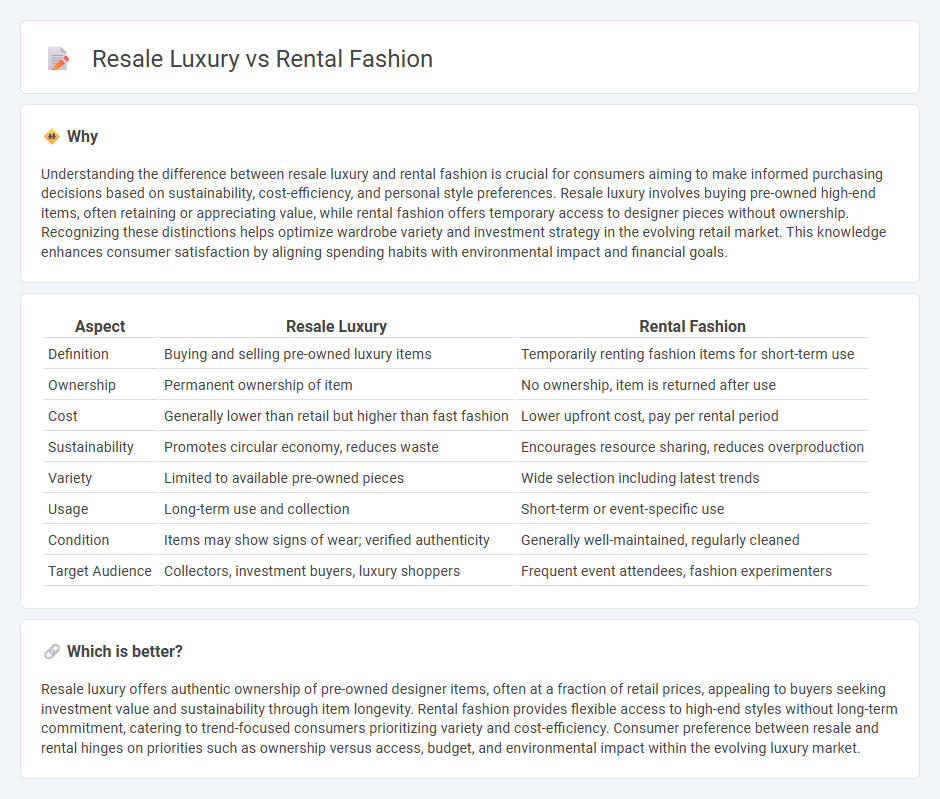
Resale luxury and rental fashion represent two dynamic sectors within the retail industry, each catering to different consumer preferences for sustainable and affordable high-end style. Resale luxury offers the appeal of ownership with potential investment value through authenticated pre-owned designer goods, while rental fashion provides flexibility and variety without long-term commitment. Explore the evolving trends and benefits that make both resale and rental options essential in modern luxury retail.
Why it is important
Understanding the difference between resale luxury and rental fashion is crucial for consumers aiming to make informed purchasing decisions based on sustainability, cost-efficiency, and personal style preferences. Resale luxury involves buying pre-owned high-end items, often retaining or appreciating value, while rental fashion offers temporary access to designer pieces without ownership. Recognizing these distinctions helps optimize wardrobe variety and investment strategy in the evolving retail market. This knowledge enhances consumer satisfaction by aligning spending habits with environmental impact and financial goals.
Comparison Table
| Aspect | Resale Luxury | Rental Fashion |
|---|---|---|
| Definition | Buying and selling pre-owned luxury items | Temporarily renting fashion items for short-term use |
| Ownership | Permanent ownership of item | No ownership, item is returned after use |
| Cost | Generally lower than retail but higher than fast fashion | Lower upfront cost, pay per rental period |
| Sustainability | Promotes circular economy, reduces waste | Encourages resource sharing, reduces overproduction |
| Variety | Limited to available pre-owned pieces | Wide selection including latest trends |
| Usage | Long-term use and collection | Short-term or event-specific use |
| Condition | Items may show signs of wear; verified authenticity | Generally well-maintained, regularly cleaned |
| Target Audience | Collectors, investment buyers, luxury shoppers | Frequent event attendees, fashion experimenters |
Which is better?
Resale luxury offers authentic ownership of pre-owned designer items, often at a fraction of retail prices, appealing to buyers seeking investment value and sustainability through item longevity. Rental fashion provides flexible access to high-end styles without long-term commitment, catering to trend-focused consumers prioritizing variety and cost-efficiency. Consumer preference between resale and rental hinges on priorities such as ownership versus access, budget, and environmental impact within the evolving luxury market.
Connection
Resale luxury and rental fashion share a symbiotic relationship by extending the lifecycle of high-end garments, promoting sustainability within the retail sector. Consumers seeking access to premium brands benefit from affordable rental options, while resale platforms offer a marketplace for pre-owned luxury items, reducing waste and encouraging circular consumption. Together, these models disrupt traditional retail by catering to eco-conscious shoppers and maximizing asset utilization in the fashion industry.
Key Terms
Circular Economy
Rental fashion reduces waste and resource consumption by extending the lifecycle of garments through multiple uses, significantly lowering the environmental footprint compared to fast fashion. Resale luxury promotes circularity by enabling high-value items to retain their economic and aesthetic value over time, supporting sustainable consumer habits and reducing demand for new production. Explore how these models drive innovation in the circular economy and reshape sustainable consumption patterns.
Subscription Model
The rental fashion subscription model offers consumers access to a rotating wardrobe of luxury items without ownership, emphasizing convenience and sustainability. Resale luxury focuses on the ownership transfer of pre-owned high-end goods, catering to buyers seeking long-term value and investment pieces. Explore how subscription services are reshaping luxury fashion consumption by blending affordability with exclusivity.
Authentication
Authentication in rental fashion ensures garments' quality and originality through rigorous inspection and verification processes before each rental, minimizing risks of counterfeit or damaged items. Resale luxury platforms prioritize detailed provenance checks and expert appraisals to certify authenticity, often providing guarantees or certificates of authenticity for high-value goods. Explore further to understand how these authentication methods protect consumers and maintain trust in luxury fashion transactions.
Source and External Links
The Rise of Rental Fashion: Why Borrowing is the New Buying - Rental fashion is growing rapidly as consumers seek sustainable, cost-effective access to a wide range of clothing without the commitment of ownership, driven by environmental concerns and a shift toward minimalism and anti-consumerism.
7 Clothing Rental Brands to Try - Commons - Leading rental platforms like Rent the Runway and ModLux.Rent offer flexible subscriptions and a la carte options, enabling customers to experiment with new styles and trends while saving money and reducing fashion waste.
Taelor.Style: Dress nice with GQ Best Men's Clothing Rental - Taelor provides expert-styled men's clothing rentals from 300+ brands, featuring curated outfits, free shipping, and a focus on quality and sustainability, with no obligation to buy and a seamless swap-and-repeat process.
 dowidth.com
dowidth.com